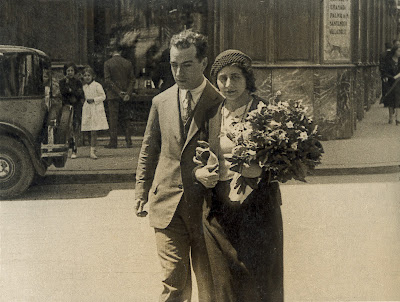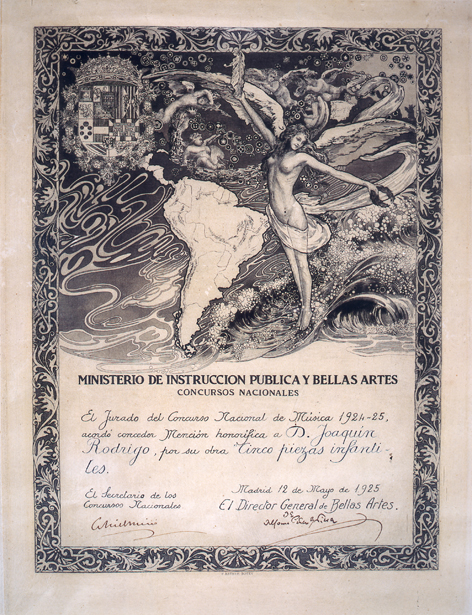Joaquín Rodrigo - The Works of 1982 – Part IV
(English/Español) Monday, December 19, 2011
If the Concerto
para una fiesta is an “incontrovertibly Spanish
work”, in the composer’s own words, the final creation of 1982, the Cántico de San Francisco de Asís, could not be more
different. Invited by the Franciscan Order in Spain to set St Francis’s
‘Canticle of the Creatures’ to music, to mark the 800th anniversary of the
Saint’s birth, Rodrigo responded to this commission with music of a quite new
kind, in which ‘Spanish’ influence is notably absent. The composer seems in fact to have wanted to create a work
in the great European choral tradition, confessing that he found his task both
pleasant and easy: “I must say that it did not require too much effort from me
– it was as though the Saint was inspiring me… In this sublime poetry all nature is reflected, as I feel
it. It is evoked in all its
splendour, all its beauty, all its joy and all its sadness… In the Cántico de San Francisco I wanted to capture in my music those words of the Saint with
simplicity and with serenity.” It
is indeed above all this feeling of serenity which the music captures – a
serenity found not only in the words of St Francis themselves, but in Rodrigo’s
own attitude to the wonders and mysteries described in the poem. The music is punctuated throughout by a
series of silences – almost as though to aid contemplation – and each phrase of
the poem is set to extraordinarily eloquent and appropriate music. If the other works of 1982 each respond
to the inspiration felt by the composer at the history and culture of aspects
of Spain and its great cities, or in the artistry of great artists who were
very special to him, the Cántico reveals not
only Rodrigo’s mastery of choral and orchestral composition, and his
extraordinary sensitivity to the words which he set to music, but his own
beliefs in the very nature of human life and its response to the wonders of the
world around us. In 1969 he had
said to José María Gironella: “at times, composing music, I have had the sense
that all that is beautiful – and the spirit is this – is certain to survive”,
and towards the end of his long life, this Cántico de San Francisco de Asís was to give perhaps the most beautiful of all his testimonies to a
continuing adherence to that personal belief.
Joaquín Rodrigo – Las obras de 1982 – IV Parte
Si el Concierto para una fiesta es una obra “incontestablemente española”, en palabras del propio compositor, la última creación de 1982, el Cántico de San Franciscode Asís, no podría ser más distinta. Invitado por la orden franciscana en España a poner música al ‘Cántico de las criaturas’ de San Francisco para conmemorar el 800º aniversario del nacimiento del Santo, Rodrigo respondió a este encargo con un música de estilo completamente nuevo, en la que desaparece cualquier influencia ‘española’. El compositor aparentemente quería crear una obra en la gran tradición coral europea, y confesó que había encontrado su tarea tan fácil como agradable: “puedo decir que no me costó demasiado esfuerzo, parecía que el Santo me inspiraba ... En estos versos sublimes se refleja toda la naturaleza, tal como la siento. Está evocada con todo su esplendor, con toda su hermosura, con toda su alegría y su tristeza … En el Cántico de San Francisco quise captar con mi música esos versos del Santo, con sencillez y serenidad.” Es sobre todo este sentido de serenidad que expresa la música – una serenidad que se encuentra no sólo en las mismas palabras de San Francisco, sino también en la actitud de Rodrigo hacia las maravillas y los misterios descritos en el poema. La música es interrumpida aquí y allá por toda la obra por momentos de silencio – casi como para ayudar a la contemplación – y a cada frase del poema el compositor ha puesto música apropiada y de una extraordinaria elocuencia. Si las otras obras de 1982 responden cada una a una inspiración experimentada por el compositor ante la historia y la cultura de aspectos de España y sus grandes ciudades, o ante el arte de grandes y muy queridos artistas, el Cántico revela no sólo la maestría de Rodrigo en cuanto a composición coral y orquestal y su extraordinaria sensibilidad hacia los textos a los que ponía música, sino también sus propias creencias en la propia naturaleza de la vida humana y su respuesta a las maravillas del mundo. En 1969 el Maestro comentó a José María Gironella: “a menudo, componiendo música, he tenido la sensación de que todo lo bello – y el espíritu lo es – ha de perdurar”, y ya hacia el final de su larga vida, quizá este Cántico de San Francisco de Asís fuera el mejor testimonio musical de esta creencia personal.
Raymond Calcraft. Ex Jefe del Departamento de Estudios Hispánicos de la Universidad de Éxeter. Director de orquesta y de coro






Comentarios
Publicar un comentario